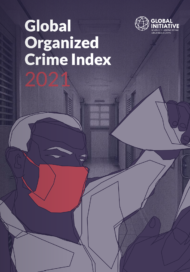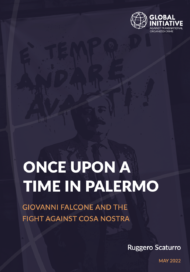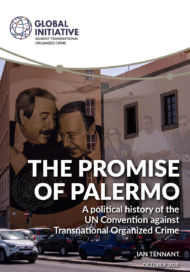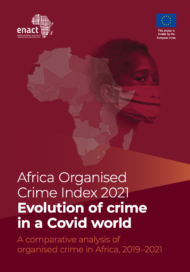Posted on 27 May 2022
From 29 to 30 April, leaders from a number of institutions and civil society organizations gathered in Rome to take stock of the current dynamics of organized crime and map out priorities in developing anti-mafia and anti-corruption measures, as well as avenues for international engagement to respond to transnational organized crime networks.
The Rome conference, organized by Libera, a network of Italian associations and civil society groups, addressed new ways to confront the mafia and fight corruption in the wake of the COVID-19 pandemic; discuss concerns of mafia infiltration and corruption linked to Italy’s post-pandemic national recovery plan; and develop tools and policies aimed at fostering innovative actions.
At the conference, the Global Initiative Against Transnational Organized Crime (GI-TOC) took part in one of the thematic working groups and presented the 2021 Global Organized Crime Index, as a contribution to the discussion on security threats in Africa. Speakers at the session included the EU Special Representative for the Sahel, Emanuela Del Re; UNHCR delegate Alessandra Morelli; and activist and representative of the Congolese community in Italy, Anselme Bakudila.
Participants at this working group reflected on how organized crime – and mafia groups in particular – can no longer be considered nationally contained entities to be countered with a one-size-fits-all state response. Mafia-style groups have become transnational threats and the fight against them requires a high degree of cooperation at all levels. Mafias are not only an Italian problem: they operate in a number of countries and are increasingly present in Africa, where they can find new opportunities to expand. This underscores the need for collective social, cultural and political action that takes into account the transnational nature of the issue.
Participants discussed how criminal groups generally have become more globalized and agile than they once were. Transnational networks facilitate trafficking of illicit goods, which – together with regions prone to the destabilizing effects of conflict, threats to democracy and fragile rule of law – creates pockets of insecurity. According to the 2021 Index rankings, Africa is the continent with the highest level of criminality in the world after Asia and is growing. One of the key findings of the Index is that most of the continent’s population lives in countries that have a strong presence of organized criminal activity, with a continental criminality average of 5.17 out of 10, up from the 2019 ENACT Organized Crime Index for Africa average of 4.97. At the same time, the majority of Africans live in countries with low levels of resilience to organized crime (with a 2021 continental resilience average of 3.80, down from 3.86 in 2019). Human trafficking, arms and drug trafficking, and environmental crimes are among the illicit economies most commonly perpetrated by criminal groups operating on the continent and have all increased since 2019, with the exception of the heroin trade.
It is erroneous to believe that organized crime groups are solely composed of gangs or cartels. Indeed, in line with global trends, the Index finds that state-embedded actors, i.e. individuals and institutions operating within the public apparatus, dominate Africa’s criminal landscape, and have expanded their influence amid the pandemic. From low-level officials in criminal justice and other state institutions to the highest echelons of government, exploiting the privilege of public office to pursue private interests leads to widespread corruption, weakening the credibility of institutions and the resilience of civil society. In such cases, it is the state itself – which is supposed to be the driving force in the fight against organized crime – that may hamper countermeasures and even perpetrate criminal activities.
More broadly, another factor that the Index pays particular attention to is the relationship between governance and resilience. The results of the Index show that countries categorized as full democracies, on average, experience higher levels of resilience than authoritarian states. States that are participatory, accountable, effective, and guided in their policy actions by the rule of law are more likely to foster the conditions for the creation of state and non-state structures capable of combating organized crime. In authoritarian contexts, on the other hand, organized crime is often an integral part of the system. This usually occurs through the influence of state-embedded criminal actors or by granting a monopoly over criminal markets to groups acting on their behalf.
The Index also highlights the relationship between crime and conflict. Overall, countries with the highest scores in terms of organized crime levels are those experiencing war, insecurity, and instability. And this is especially true in certain African countries experiencing ongoing conflicts and insecurity, such as the Democratic Republic of Congo and Nigeria (ranked first and second in criminality on the continent respectively). However, this crime–conflict nexus is not unidirectional; just as conflict creates and sustains criminal markets, illicit economies also contribute to and fuel conflict. Conflict and instability are also linked to resilience levels. In countries with socio-political or economic instability brought about by conflict or other threats to peace, the authorities’ attention is diverted to war efforts, which inevitably weakens a state’s capacity to respond to illicit markets. Combined with a decrease in a country’s territorial control and internal social cohesion, this contributes to a general decline in resilience to organized crime.
Speakers at the session said that Europe must maintain its position as a partner with key African stakeholders in countering organized crime on the continent. Drawing on its regulatory, organizational, and operational knowledge, accumulated over decades of cooperation among member states, the European Union is well positioned to provide support to African counterparts in their efforts to tackle the organized crime phenomenon, including by outlining common paths that lead to effective, sustainable results. This work must also be strengthened with the inclusion of civil society organizations, able to provide insights into developments on the ground and represent the chorus of local voices affected by organized crime around the world. Recognizing the ubiquity of organized crime as a shared threat, it was concluded that lessons learned from the Italian mafia experience and Italy’s social justice framework are beneficial for the development of a joint and comprehensive response to organized crime.
This analysis is part of the GI-TOC’s series of articles delving into the results of the Global Organized Crime Index 2021. The series explores the Index’s findings and their effects on policymaking, anti-organized crime measures and analyses from a thematic or regional perspective.
Subscribe to the dedicated newsletter to get regular updates about the project and the launch event



